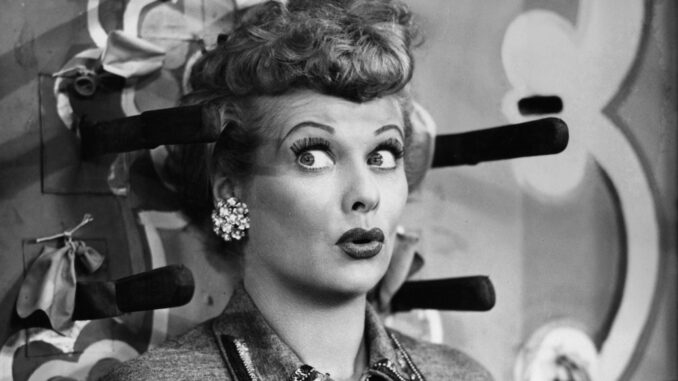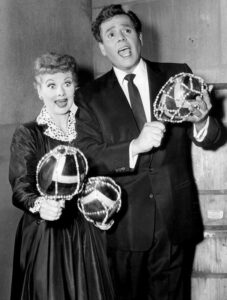
Introduction: The Birth of a TV Icon
Lucille Ball is a name synonymous with comedy, charisma, and groundbreaking television. But what led her to take the leap from a successful film career to the small screen with I Love Lucy? The decision wasn’t just a career move—it was a bold, calculated risk fueled by love, ambition, and a desire to reshape the entertainment industry. Let’s dive into the real story behind Lucille Ball’s decision to create the iconic sitcom that changed television forever.
The Early Years of Lucille Ball’s Career
From Struggling Actress to Hollywood Starlet
Before I Love Lucy, Lucille Ball had already made a name for herself in Hollywood. Starting as a model and chorus girl, she worked her way into B-movies, earning the nickname “The Queen of the Bs.” Despite her growing popularity, she longed for roles that showcased her comedic talent.
The Rise of a Comedy Queen
Lucille’s knack for physical comedy became evident in films like The Big Street and Too Many Girls. However, Hollywood wasn’t offering her the creative freedom she craved. She was often typecast as the glamorous sidekick, and her comedic genius remained underutilized.
The Role of Desi Arnaz in the Decision
A Love Story Written in the Stars
Lucille Ball’s relationship with Desi Arnaz played a pivotal role in her decision to transition to television. The couple, despite their deep love, faced challenges due to their demanding careers, which often kept them apart.
A Plan to Save Their Marriage
Lucille saw I Love Lucy as a way to work alongside Desi and strengthen their bond. By casting him as her on-screen husband, she cleverly merged her personal and professional lives, ensuring they spent more time together.
Television’s Untapped Potential
The Shift from Film to TV
In the early 1950s, television was still a relatively new medium, often considered a step down from film. However, Lucille Ball recognized its potential to reach a wider audience and build a lasting legacy.
The Studio’s Reluctance
CBS was initially hesitant about casting Desi Arnaz, fearing audiences wouldn’t accept a mixed-race couple. Lucille stood her ground, proving she was not only a comedic genius but also a trailblazer willing to challenge societal norms.
The Creation of ‘I Love Lucy’
Breaking Barriers in Television
Lucille Ball and Desi Arnaz revolutionized the sitcom format by introducing techniques like the multi-camera setup and live studio audiences. These innovations set the standard for future television productions.
The Power of Collaboration
Lucille and Desi’s production company, Desilu Productions, gave them full creative control. This allowed Lucille to showcase her comedic talent without interference, creating a show that resonated with millions.

The Financial Gamble
Risking It All
Lucille and Desi financed the pilot episode themselves, a bold move that demonstrated their confidence in the project. This gamble paid off, as I Love Lucy became an instant hit, cementing their place in television history.
A Legacy of Ownership
By retaining ownership of the show, Lucille and Desi set a precedent for actors to have more control over their work. This decision not only secured their financial future but also empowered future generations of creators.
Cultural Impact of ‘I Love Lucy’
Redefining the American Family
The show depicted relatable, everyday struggles with humor and heart. Lucy and Ricky’s dynamic resonated with audiences, breaking stereotypes and redefining the portrayal of marriage on TV.
A Global Phenomenon
I Love Lucy wasn’t just a hit in America—it became a global sensation, proving that laughter transcends cultural boundaries. Lucille Ball’s comedic timing and Desi Arnaz’s musical charm captivated audiences worldwide.
Why Lucille Ball’s Decision Still Matters
Inspiring Future Generations
Lucille Ball’s bold move to television inspired countless women in entertainment. Her success proved that women could lead, innovate, and dominate in a male-dominated industry.
A Legacy of Laughter
Decades later, I Love Lucy remains a cultural touchstone. Its timeless humor and groundbreaking format continue to influence sitcoms and bring joy to new generations of viewers.
The Real Reason Behind the Decision
Love, Ambition, and Vision
Lucille Ball’s decision to create I Love Lucy wasn’t just about career advancement. It was about love—love for Desi, love for comedy, and love for the art of storytelling. Her ambition and vision turned a personal dream into a cultural phenomenon.
Conclusion: The Woman Who Changed Television
Lucille Ball’s decision to do I Love Lucy was a game-changer, not just for her career but for the entire entertainment industry. By combining her comedic genius with Desi Arnaz’s business acumen, she created a show that broke barriers, set new standards, and left an indelible mark on television history. Her journey from Hollywood starlet to TV legend is a testament to the power of love, ambition, and innovation.
5 Unique FAQs
Q1: Why did Lucille Ball transition from film to television?
Lucille wanted more creative control and saw television as an opportunity to showcase her comedic talent while spending more time with her husband, Desi Arnaz.
Q2: What challenges did Lucille Ball face when creating I Love Lucy?
She faced resistance from CBS about casting Desi Arnaz and took financial risks by funding the pilot episode herself.
Q3: How did I Love Lucy change television?
The show introduced innovations like the multi-camera setup and live studio audience, setting the standard for sitcoms.
Q4: What is the legacy of I Love Lucy?
The show remains a timeless classic, influencing generations of comedians and television creators.
Q5: How did Lucille Ball’s decision impact women in entertainment?
Her success demonstrated that women could lead and innovate in a male-dominated industry, paving the way for future female creators.